Trending...
- InventHelp Inventor Develops New Accessory for Fishermen (TGR-242)
- Tampa-Based Digital Marketing Agency Launches New Website to Help Local Businesses Grow Online
- myb.day Launches New Birthday Gift Shop Filled With Personalized Surprises
Dr. R. Douglas Fields is a pioneer on nervous system development, plasticity, memory
HURST, Texas - Washingtoner -- R. Douglas Fields, Ph.D., a neuroscientist and author of numerous books and magazine articles about the brain, has been awarded the fourth Mensa Foundation Prize for his research in plasticity and active myelination in brains related to learning and intelligence.
The biennial Mensa Foundation Prize honors the best discoveries in intelligence and creativity and is endowed by the estate of Kenneth Douglas Thomson (1934-2013), a longtime Mensa member. The award, which includes a $10,000 award, will be presented at American Mensa's Annual Gathering, July 5-9, in Baltimore, and Dr. Fields will give a presentation on his work.
Dr. Fields' long-standing research interest is in how functional activity influences nervous system development and plasticity along with the cellular mechanisms of memory. He is recognized internationally for his research on glia, which are brain cells that communicate without electricity, and for his pioneering discoveries on a new cellular mechanism of learning involving glial cells that form myelin. Myelin is the electrical insulation on nerve fibers, which speeds transmission of neural impulses. Dr. Fields' research shows that the glial cells forming myelin can sense neural impulse activity and that they contribute to learning and memory by changing the speed of neural impulse transmission to optimize the synchrony of information arriving at relay points in neural networks.
More on Washingtoner
"I am especially gratified by my research on how myelin contributes to learning," Dr. Fields said, "because it overturns long-standing dogma about myelin — that it is static electrical insulation — and because it is a complete departure from how neuroscientists have thought about the mechanisms of learning and memory being based only on modifying synapses."
The Mensa Foundation Prize Committee praised the impressive scientific detail of Dr. Fields' work and his creative point of view. "Each small component of the rather complex glial model is backed by numerous rigorous multidisciplinary experiments involving imaging, chemistry, actual measurement of nerve conduction speed, and correlated animal learning experiments," said Dr. Susan Stine, Mensa Foundation Prize Committee member. "I think the sheer body of work and the observations using multiple experimental designs is amazing."
Joining Dr. Stine on the Mensa Foundation Prize Committee are:
Dr. Fields is Chief of the Nervous System Development and Plasticity Section at the National Institutes of Health, an American Association for the Advancement of Science Fellow, and University of Maryland adjunct professor. He received advanced degrees at U.C. Berkeley, San Jose State University, and U.C. San Diego and was a postdoctoral fellow at Stanford and Yale universities and at the NIH prior to starting his own NIH lab in 1994.
More on Washingtoner
Outside the lab, he writes about science for Scientific American, Quanta, Outside Magazine, Huffington Post, Undark Magazine, Psychology Today, and many others. His neuroscience research has been featured on national television, radio, NPR, the National Geographic, and other media, and he speaks about neuroscience for the general public on NPR, World Science Festival, TEDex, Google Talks, and others.
The first Mensa Foundation Prize was awarded in 2017 to Dr. David Silver, who led Google's efforts to develop the first computer program to defeat the world's best Go players. In 2019 neuroscientist Dr. Aron K. Barbey was recognized for significantly advancing the neuroscience of brain connectivity with his innovative research applying functional magnetic resonance imaging to the mapping of brain lesions and measuring their effects on raw intelligence. And in 2021, statistical geneticist Dr. Danielle Posthuma of the Netherlands was awarded the third Mensa Foundation Prize for her research directly identifying, for the first time, hundreds of human genes highly correlated to variations in intelligence.
"This award is such a great honor," Dr. Fields said, "because it comes from a group of people from all walks of life in an organization that values and supports science and creativity for the simple reason that human beings are deeply curious about the natural world and driven to explore and understand it."
The biennial Mensa Foundation Prize honors the best discoveries in intelligence and creativity and is endowed by the estate of Kenneth Douglas Thomson (1934-2013), a longtime Mensa member. The award, which includes a $10,000 award, will be presented at American Mensa's Annual Gathering, July 5-9, in Baltimore, and Dr. Fields will give a presentation on his work.
Dr. Fields' long-standing research interest is in how functional activity influences nervous system development and plasticity along with the cellular mechanisms of memory. He is recognized internationally for his research on glia, which are brain cells that communicate without electricity, and for his pioneering discoveries on a new cellular mechanism of learning involving glial cells that form myelin. Myelin is the electrical insulation on nerve fibers, which speeds transmission of neural impulses. Dr. Fields' research shows that the glial cells forming myelin can sense neural impulse activity and that they contribute to learning and memory by changing the speed of neural impulse transmission to optimize the synchrony of information arriving at relay points in neural networks.
More on Washingtoner
- ScreenPoints Puts Film Investors in the Credits—and in the Money With New FinTech Platform
- Pathways to Adulthood Conference May 17 at Melville Marriott Honoring NYS Assembly Member Jodi Giglio, Suffolk County Legislator Nick Caracappa
- Adster Techologies awarded US Patent for breakthrough innovation in reducing latency in Ad Serving
- Robert Fabbio Inducted into the Austin Technology Council Hall of Fame
- Cybersecurity is Protecting Your Personal Information and Your Portfolio
"I am especially gratified by my research on how myelin contributes to learning," Dr. Fields said, "because it overturns long-standing dogma about myelin — that it is static electrical insulation — and because it is a complete departure from how neuroscientists have thought about the mechanisms of learning and memory being based only on modifying synapses."
The Mensa Foundation Prize Committee praised the impressive scientific detail of Dr. Fields' work and his creative point of view. "Each small component of the rather complex glial model is backed by numerous rigorous multidisciplinary experiments involving imaging, chemistry, actual measurement of nerve conduction speed, and correlated animal learning experiments," said Dr. Susan Stine, Mensa Foundation Prize Committee member. "I think the sheer body of work and the observations using multiple experimental designs is amazing."
Joining Dr. Stine on the Mensa Foundation Prize Committee are:
- Dr. Harry Ringermacher, Ph.D., physics, the committee chair and a Mensa member.
- Dr. Ivar Giaever, Ph.D., physics, microbiologist, and winner of the 1973 Nobel Prize in Physics.
- Dr. Steven Maranz, Ph.D., plant science, microbiologist, and a Mensa member.
- Judith A. Keating, CPA, TCE-IRS, and a Mensa member.
Dr. Fields is Chief of the Nervous System Development and Plasticity Section at the National Institutes of Health, an American Association for the Advancement of Science Fellow, and University of Maryland adjunct professor. He received advanced degrees at U.C. Berkeley, San Jose State University, and U.C. San Diego and was a postdoctoral fellow at Stanford and Yale universities and at the NIH prior to starting his own NIH lab in 1994.
More on Washingtoner
- L2 Aviation Celebrates Grand Opening of New Facility at Cincinnati/Northern Kentucky International Airport (CVG)
- Spokane: Flags Lowered for Justice Owens
- Managing Summer Staffing Surges with Confidence: Why Name Badges Are a Must for Seasonal Success
- Visa Named Title Sponsor of Ascending Athletes' Business Owners Summits for NFL Entrepreneurs
- Space Resources Company Interlune Unveils Full-Scale Prototype of Excavator for Harvesting Helium-3 from the Moon
Outside the lab, he writes about science for Scientific American, Quanta, Outside Magazine, Huffington Post, Undark Magazine, Psychology Today, and many others. His neuroscience research has been featured on national television, radio, NPR, the National Geographic, and other media, and he speaks about neuroscience for the general public on NPR, World Science Festival, TEDex, Google Talks, and others.
The first Mensa Foundation Prize was awarded in 2017 to Dr. David Silver, who led Google's efforts to develop the first computer program to defeat the world's best Go players. In 2019 neuroscientist Dr. Aron K. Barbey was recognized for significantly advancing the neuroscience of brain connectivity with his innovative research applying functional magnetic resonance imaging to the mapping of brain lesions and measuring their effects on raw intelligence. And in 2021, statistical geneticist Dr. Danielle Posthuma of the Netherlands was awarded the third Mensa Foundation Prize for her research directly identifying, for the first time, hundreds of human genes highly correlated to variations in intelligence.
"This award is such a great honor," Dr. Fields said, "because it comes from a group of people from all walks of life in an organization that values and supports science and creativity for the simple reason that human beings are deeply curious about the natural world and driven to explore and understand it."
Source: Mensa Foundation
0 Comments
Latest on Washingtoner
- NASDAQ Uplisting for Higher Market Exposure and Wide Corporate Benefits to AI Boosted Marketing Company On Track Towards $1 Billion Revenue by 2027
- Congressional Men's Health Caucus Shows Bipartisan Consensus and Focus on Prevention, Mental Health, and Closing the Lifespan Gap
- DuoKey, Axiomtek and Blue Edge Network Partner to Enhance Smart Cities with Privacy-Preserving Urban Safeguarding and Fleet Management
- PNNL's Grid Storage Launchpad honored with 2025 BCI Innovation Award
- Austin Keen Joins WakeFX RopePal as Official Brand Ambassador
- Bonelli Systems Expands Managed IT Services Nationwide, Leveraging Microsoft Azure Expertise
- $4.3 Million Patent Application Waiver Fee Granted by FDA on New Drug Application Fee for Treatment Addressing Suicidal Depression & PTSD: NRX Pharma
- Whistleblower Claims Dental Patient Deaths Likely Due to Book Ban
- xREnergy up as much as +3,094,634% on first day listed on the XRP Ledger. Ticker : $XRE
- Psychiatry's Legacy of Racism and Coercion Highlighted in Restraint Deaths
- New Book 'Cybersecurity Leadership' Guides SME Leaders to Make Smart, Strategic Security Decisions
- "Stop scrolling and start watching" - Beloved film recommendation site Criticker gets a major makeover
- Green Energy Solar Expands with New Offices in Port St. Lucie, West Palm Beach, and Orlando
- IGT PlaySports Introduces World-Class Retail Sports Betting to Silver Reef Casino Resort
- Events by Dubsdread Expands Services to The Venue at Lake Lily
- London Gala Emphasizes Trade, FDI and Ongoing Cooperation
- Sahit Muja Launches Trillion-Dollar Green Revolution with 10 Groundbreaking Cryptos
- Free and Low-Cost Dental Care Now Available in London Through the Canadian Dental Care Plan (CDCP)
- Garden State Gay Socials Turns One: 1st Birthday Celebration for Gay Men Who Want Real Connection
- Sea Fox® 368X "Extreme Edition" by Black Label Marine Group Celebrates 5 Years of the Commander Legacy


